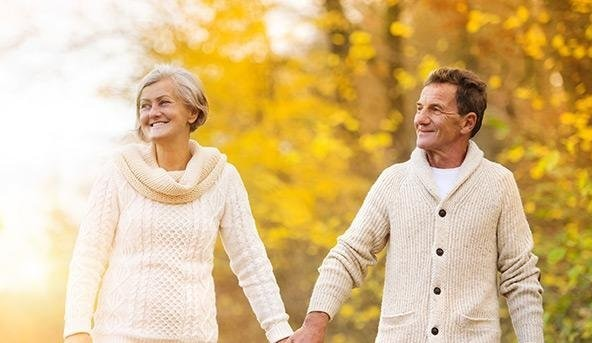4 min read//
Only 150 minutes of exercise per week (with 20 minutes vigorous) are needed for a healthy life. This is only 22 minutes per day with 3 minutes vigorous. Exercise keeps you stay strong and nimble and helps you avoid falls which lead to a move into a retirement or nursing home.
Some of the things we lose as we age can actually be prevented, including:
- Strength: Experts have suggested that muscle mass declines about 1% each year from age 30
- Endurance: As we age, we tend lose aerobic fitness and this often contributes to reduced stamina which in turn will affect our quality of life
- Flexibility: Joints change with age and this leads to stiffness, and decreased range of motion. This in turn can make the difference of leading an independent life, if you can’t bend over and put your socks and shoes on, you will be heavily dependent on others to help you
- Balance: Each year, hospitals see thousands of older patients who have fallen over and broken their hip. Balance exercises can help you avoid injuries from falls and keep you independent and mobile
- Stress: Stress has been known to cause high blood pressure, which can then lead to heart disease. Chronic stress and depression have also been shown to increase the risk for cancer as your immune system weakens. Physical signs of stress include headaches, racing heart, difficulty sleeping and aches and pains, while the emotional signs range from anxiety and frequent mood swings to sadness and depression
- Heart Health: The heart is a muscle, and it gets stronger and healthier if you lead an active life. Even taking a brisk walk for 30 minutes a day can make a big difference
Most retirees return to exercise to regain some flexibility, endurance or strength. Exercise reduces the risk of early death, helps control weight and lowers the risk of heart disease, stroke, type 2 diabetes, depression, some types of cancer, anxiety disorders, cognitive decline and hip fractures. It can help improve sleep, memory, concentration and mood. Recent research showed physical activity may be as effective as medication in preventing early death in people who've had heart attacks or strokes.
As long as you go about it sensibly, exercising has few risks, and certainly fewer than doing very little physical activity as the alternative. The benefits of exercise include:
- Making you physically stronger and therefore less likely to become ill or incapacitated
- Making it more achievable to manage your weight
- Providing you with a greater sense of confidence and wellbeing
- Often helping you sleep better
The very best exercise for seniors is walking or swimming. Seniors interested in these most basic exercises need to develop a walking or swimming routine. Having a dog is also a great way to create a daily walking routine. Other exercises are tai chi, yoga or Pilates where slow, gentle motion help with posture and balance.











